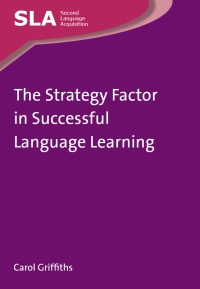The Strategy Factor in Successful Language Learning by Carol Griffiths
Adem Soruç, Turkey
Adem Soruç (previewer) is currently teaching at Fatih University in Istanbul, Turkey. He is carrying out research for a PhD on the role of input and output in language development. He has published a number of articles and presented at conferences in Turkey and abroad. E-mail: adem_soruc@hotmail.com
Carol Griffiths (author) has been a teacher, manager and teacher trainer of ELT for many years. She completed a PhD on the subject of learning strategies at the University of Auckland. She has taught in New Zealand, Indonesia, Japan, China, North Korea, UK, and is currently working at Faith University in Istanbul, Turkey. She has published widely, including her book ‘Lessons from Good Language Learners’, and presented at many conferences around the world. E-mail: carolgriffiths5@gmail.com

When Joan Rubin published her seminal article “What the ‘Good Language Learner’ can teach us” (1975), probably few expected that it would sow the seeds of controversies which would still be unresolved several decades later. The Strategy Factor in Successful Language Learning endeavours to help resolve some of the controversies by clarifying basic concepts, especially of terminology, definition, effectiveness, theoretical underpinnings and classification; by addressing fundamental questions regarding the relationships among successful language learning and strategy frequency, quantity, type and use according to learner, situational or target variables; by considering strategy effectiveness from an individual point of view, particularly in relation to a range of learner variables; by discussing pedagogical issues, especially relating to teacher perceptions and training, classroom and learner factors, methodology and content, as well as considering situational and target variables; and by identifying areas still requiring research clarification
The book aims to achieve these objectives by means of an extensive review, analysis and re-interpretation of the existing literature. It also provides quantitative research evidence for the fundamental questions noted above by means of empirical studies, as well as qualitative research evidence regarding individual strategy use by means of interviews. In addition, pedagogical research is provided and implications are drawn for classroom practice and teacher education. Furthermore, for those who are interested in research many recommendations are made for areas still requiring further research.
The strategy concept is of interest to a potentially wide range of readers, but this book is especially intended for students who are working on a variety of diploma or degree programmes in the language learning area for whom the discussion and references would be extremely useful when completing assignments or theses; for teacher educators, practising teachers or teacher trainees for whom the pedagogical implications of the numerous findings described in the book are especially relevant; and for researchers, for whom the numerous under-researched areas pointed out may help to indicate directions for future useful studies.
The book is organised into four main chapters. Chapter one deals with the essential concepts of terminology, effectiveness, underlying theory and classification, and attempts a definitive definition based on essential elements extracted from the literature. Chapter two looks at the answers to some basic questions regarding strategy use and the relationship to other variables and to successful learning outcomes. It reports a number of studies which address some of the vexed issues involved. Chapter three approaches the strategy issue from the individual student’s point of view. Although quantitative findings such as those presented in Chapter two are valuable, and may well be used to inform teaching practice, individuals never quite conform to statistical expectations, and it is essential to allow for individual variation when considering effective language learning and strategy use. And Chapter four looks at the pedagogical research. Studies of teacher perceptions and of strategy based instruction are reviewed, along with findings regarding methodology and content. Learner, situational and target variables are considered as well as issues for teacher training.
The Strategy Factor in Successful Language Learning is different from previous books in a number of ways. The learning strategy field has at times been criticized for being a theoretical. This book addresses underlying theoretical issues in the first chapter by looking at terminology, definition, theoretical underpinnings and classification systems. Rather than merely discuss the concepts, this book presents evidence from empirical studies for each of the fundamental questions posed in Chapter two. In addition to the quantitative view taken in Chapter two, the book takes a qualitative look at strategy use by individuals in Chapter 3 and considers the implications of the interview data. Finally in Chapter four, rather than looking at strategies divorced from the “real world” of the classroom, this book looks at the issues from the teaching/learning point of view. In addition, the book contains multiple suggestions for further research, a glossary which explains essential terms, an extensive bibliography, appendices containing the instruments used in the studies which might be useful for replication studies, and an index for ease of reference.
According to the author, strategies are an essential tool for learners who want to succeed at learning language. By providing practical information based on research evidence, The Strategy Factor in Successful Language Learning makes a useful contribution to our knowledge of this controversial area.

Please check the How the Motivate your Students course at Pilgrims website.
Please check the How to be a Teacher Trainer course at Pilgrims website.


|